|
|
|
Sort Order |
|
|
|
Items / Page
|
|
|
|
|
|
|
| Srl | Item |
| 1 |
ID:
086137
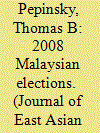

|
|
|
|
|
| Publication |
2009.
|
| Summary/Abstract |
Malaysia's twelfth general elections, held on March 8, 2008, dealt a stunning blow to the incumbent Barisan Nasional regime. For the first time since 1969, the coalition did not receive its customary two-thirds majority in the lower house of parliament. Moreover, the opposition was able to form governments in five out of eleven peninsular Malaysian states. This article uses electoral, economic, and demographic data to test a number of potential explanations for these outcomes. Evidence indicates that the regime's decreased majority is the consequence of non-Malay voters' rejecting the incumbent regime in favor of secular opposition parties.
|
|
|
|
|
|
|
|
|
|
|
|
|
|
|
|
| 2 |
ID:
140284


|
|
|
|
|
| Summary/Abstract |
In this article we examine the electoral impact of urbanization vis-à-vis ethnicity in Malaysia. We employ a robust econometric technique, the fractional response logit model, on data from the recently concluded thirteenth general election. The findings show that there are both an ethnic effect and an urban effect in determining the distribution of parliamentary seats among the political groups. Strong support for the opposition coalition, Pakatan Rakyat, was evident in urban constituencies, while the ruling coalition, Barisan Nasional, continued to enjoy success in rural constituencies. Although Barisan Nasional is still dependent on Bumiputera support, its success is also dependent on non-Bumiputera support from rural constituencies. However, with declining birthrates among the Chinese electorates, this support may not be forthcoming in future elections. We also provide insights for both coalitions to consider in developing strategies for the next election.
|
|
|
|
|
|
|
|
|
|
|
|
|
|
|
|
| 3 |
ID:
125031
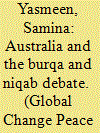

|
|
|
|
|
| Publication |
2013.
|
| Summary/Abstract |
This paper locates the discussion on wearing niqab and burqa within the context of information acquisition and response formation among Muslims and non-Muslims in the contemporary world. The paper argues that, against the backdrop of varied opinions on Islam and Muslims around the world, the debate on wearing burqa represents the continuation - albeit up-scaling - of the focus on Muslim women as the signifiers of Islam and Muslim identities. Australia is influenced by, and dealing with, the debate on whether or not to ban the burqa and niqab. Opinions among both the wider community and Muslims have differed on the justification and advisability of such a ban. The Australian government at the federal and state levels has demonstrated cautious activism in dealing with the issue, thus protecting the rights of Australian Muslim minorities, and reducing the space in which a heightened sense of exclusion could develop among them.
|
|
|
|
|
|
|
|
|
|
|
|
|
|
|
|
| 4 |
ID:
057331
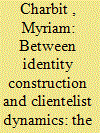

|
|
|
| 5 |
ID:
058824
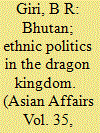

|
|
|
| 6 |
ID:
163307
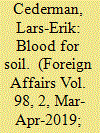

|
|
|
|
|
| Summary/Abstract |
Since the French Revolution, nationalism—the idea that state borders should coincide with national communities—has constituted the core source of political legitimacy around the world. As nationalism spread from western Europe in the early nineteenth century, it became increasingly ethnic in nature. In places where the state and the nation did not match up, such as Germany, Italy, and most of eastern Europe, the nation tended to be defined in terms of ethnicity, which led to violent processes of unification or secession. At the beginning of the twentieth century, ethnic nationalism came to disrupt political borders even more, leading to the breakup of multiethnic empires, including the Habsburg, Ottoman, and Russian ones. By changing the size of Europe’s political units, this undermined the balance of power and contributed to two world wars
|
|
|
|
|
|
|
|
|
|
|
|
|
|
|
|
| 7 |
ID:
100502
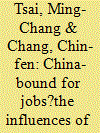

|
|
|
|
|
| Publication |
2010.
|
| Summary/Abstract |
Taiwan has long been recognized as a labour-absorbing society, but today approximately 3 per cent of its population is working in China, an increasingly important destination for regional immigration. In this article we go beyond conventional immigration economics to examine how social connections and ethnic politics affect Taiwanese motivations to move to China for employment. Results from a national random-sample survey conducted in 2005 are used to analyse the willingness and potentiality of Taiwanese to work in China. The findings indicate that besides human capital factors, social networks and political/ethnic identity offer insights to understanding migrations among Taiwanese, as well as why the vast majority have so little interest in going China-bound.
|
|
|
|
|
|
|
|
|
|
|
|
|
|
|
|
| 8 |
ID:
186810


|
|
|
|
|
| Summary/Abstract |
A core function of contemporary states is to ensure the security of their citizens. Yet in many post-conflict settings, non-state actors provide security alongside the state, typically prioritizing their own ascriptive groups and potentially undercutting a sense of national political community. When do citizens prefer group-specific versus national security? While most studies focus on individual psychological factors, we argue that group-level characteristics also shape political preferences. Based on a conjoint experiment in Lebanon, we explore the relative appeal of group-specific versus national pledges to assure protection. We find that respondents view national security provision quite positively, while members of communities with stronger group-specific security simultaneously favor private provision. Individuals with closer ties to credible group security providers are also more likely to prefer those services. Citizens therefore do not see a clear trade-off between private and public protection, while group-specific legacies mediate heterogeneity in support for pluralist security provision.
|
|
|
|
|
|
|
|
|
|
|
|
|
|
|
|
| 9 |
ID:
133126
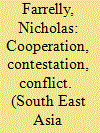

|
|
|
|
|
| Publication |
2014.
|
| Summary/Abstract |
In the period of social and political transformation that followed the election of President Thein Sein, ethnic politics remained a major preoccupation for the Myanmar government, ethnic peoples and the international community. Explaining the varieties of ethnic political interests that are emerging requires a new analytical framework in which the nascent electoral system is given adequate attention. This article argues that cooperation and contestation are now vying with conflict as primary drivers of ethnic politics. To account adequately for the interaction of these concepts, the article introduces various pieces of evidence concerning the different manifestations of ethnic political interests today. It describes an ambiguous situation in which the overall pattern of ethnic politics is changing rapidly. The challenge remains of fully reconciling Myanmar's diverse peoples and including them in one political system.
|
|
|
|
|
|
|
|
|
|
|
|
|
|
|
|
| 10 |
ID:
141158
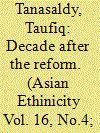

|
|
|
|
|
| Summary/Abstract |
Political reform after the departure of President Soeharto’s New Order (1966–1998) provided opportunities for previously oppressed social groups to express their concerns and to demand fair recognition. The results of this newly found freedom have been quite immediately visible in Jakarta, where social and political institutions spearheaded by Chinese originally sprouted. In the regions, political participation of ethnic Chinese has also grown; significantly in those regions with a large Chinese population. In West Kalimantan, the number of Chinese being elected to local parliaments in some regions has doubled. They have also contested numerous direct local executive elections since 2003 and have been successful in winning four posts: a mayor, a district head, a deputy district head, and a deputy governor. By looking at the case of West Kalimantan, this article will examine the factors behind the growth in Chinese political activism, the factors contributing to the success of Chinese candidates in elections, how the Chinese have influenced local and provincial politics, and the challenges they are facing.
|
|
|
|
|
|
|
|
|
|
|
|
|
|
|
|
| 11 |
ID:
107446
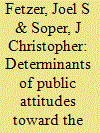

|
|
|
|
|
| Publication |
2011.
|
| Summary/Abstract |
This article investigates the current attitudes of the Taiwanese public toward
the rights of aborigines (Yuanzhumin), a neglected topic both in Taiwan and
throughout the world. The theoretical literature on ethnic politics suggests that
such attitudes might be rooted in one's level of education, ethnic group conflict
and partisanship, intergroup contact, and/or religion-like ideology (Confucian
values). Using data from the 2006 Taiwan Social Image Survey I and our 2009
privately commissioned poll on support for the rights of Taiwanese aborigines,
we test these four theories and find that higher education increases support
for aboriginal rights. The results confirm the ethno-partisanship model for
2006 but not for 2009. Conversely, the percentage of Yuanzhumin living in
a region boosted hostility toward them in 2009 but not in 2006. We likewise
discover that two Confucian values (family loyalty and social hierarchies)
have no statistically significant effect on attitudes toward Yuanzhumin. A
third key Confucian value, social harmony, appears to increase support for
aboriginal rights. Surprisingly, Confucian values seem to pose no hindrance
to the advancement of ethnic minorities' rights and may, in fact, even promote
them.
|
|
|
|
|
|
|
|
|
|
|
|
|
|
|
|
| 12 |
ID:
052062
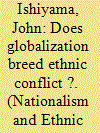

|
|
|
| 13 |
ID:
134049
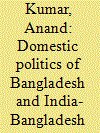

|
|
|
|
|
| Publication |
2014.
|
| Summary/Abstract |
The foreign policy of a country generally changes incrementally but in the case of Bangladesh it changes dramatically towards India depending upon which political party or alliance is in power. The ideological cleavage prevailing in the country affects not only its domestic politics but also its relationship with its neighbour India. In this article an attempt has been made to explain why and how the domestic politics of Bangladesh affects India-Bangladesh relations. It explores some of the historical processes that resulted in the formation of community consciousness among the Bengali Muslims. It also discusses the interests of different sections of society, such as the army and traders, who influenced the country's foreign policy in the post-liberation period as well as those who actively participated in the Liberation War of Bangladesh and who are pro-peasant and friendly to minorities. In this article the focus is on the domestic politics of Bangladesh. The main argument is that since there is no consensus in Bangladesh over how to best serve its national interest, the foreign policies of the two major political parties are completely different and allow the domestic politics of Bangladesh to affect the bilateral relationship with India in a way that is mostly independent of India's actions. It also suggests that India can only be insulated from Bangladeshi domestic politics after the delegitimisation of anti-liberation forces in Bangladesh, which could happen with the successful completion of the war crime trials.
|
|
|
|
|
|
|
|
|
|
|
|
|
|
|
|
| 14 |
ID:
083747
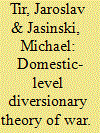

|
|
|
|
|
| Publication |
2008.
|
| Summary/Abstract |
According to the diversionary war theory, problematic domestic circumstances motivate a country's leader to divert popular discontent by launching a militarized international crisis. Yet, empirical support for this argument has proved to be ambiguous at best. Relying on extant ethnic conflict research, we argue that the embattled leader can elicit public support by using armed force against ethnic minorities within his/her country. We call this option domestic diversion and argue that it is not only available to a larger number of leaders, but that it also often presents a less risky course of action than external diversion. Empirical tests of the domestic diversionary hypothesis show a connection between domestic problems facing the leader and the use of force against minorities. This finding provides a potentially new interpretation for the causes of some domestic conflicts, and suggests that the diversionary theory may operate on the domestic level of analysis.
|
|
|
|
|
|
|
|
|
|
|
|
|
|
|
|
| 15 |
ID:
092661
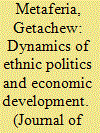

|
|
|
| 16 |
ID:
100394
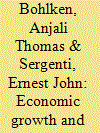

|
|
|
|
|
| Publication |
2010.
|
| Summary/Abstract |
Most studies of Hindu-Muslim riots in India have tended to emphasize the effects of social, cultural, or political factors on the occurrence of ethnic violence. In this article, the authors focus on the relationship between economic conditions and riots. Specifically, this article examines the effect of economic growth on the outbreak of Hindu-Muslim riots in 15 Indian states between 1982 and 1995. Controlling for other factors, the authors find that just a 1% increase in the growth rate decreases the expected number of riots by over 5%. While short-term changes in growth influence the occurrence of riots, this study finds no evidence of a relationship between the levels of wealth in a state and the incidence of ethnic riots. Moreover, by including state fixed effects, the authors determine that the negative relationship found between economic growth and riots is driven primarily by the relationship between growth and riots within a state over time rather than across states. These results are robust to controlling for a number of other factors such as economic inequality, demographic variables, political competition, temporal lags, spillover effects from adjacent states, and year effects. Finally, to address potential concerns that economic growth could be a consequence rather than a cause of violence or that other unobserved factors could confound the relationship between economic growth and the occurrence of Hindu-Muslim riots, the authors also employ instrumental variables (IV) estimation, using percentage change in rainfall as an instrument for growth. The results with IV estimation are similar to the results with non-IV estimation in terms of sign and significance, indicating that the negative effect of economic growth on riots is not due to reverse causality or omitted variables bias.
|
|
|
|
|
|
|
|
|
|
|
|
|
|
|
|
| 17 |
ID:
186330
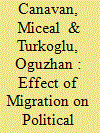

|
|
|
|
|
| Summary/Abstract |
In recent years, a record number of people have been forcibly displaced or migrated due to conflict. Whilst established political science research suggests that displaced communities are an added risk factor for conflict due to their support for extreme co-ethnic political parties and movements, this has been challenged by recent research which shows that migrants can be a moderating force. We offer a potential reconciliation of these divergent findings by distinguishing between first- and second-generation migrants. Due to their relative lack of conflict exposure, second-generation migrants will have significantly less support for co-ethnic political parties than first-generation migrants and those who remain. We test our argument using granular survey data comparing Kurds who migrated out of the conflict zone in Turkey with those who remained. The results support our theoretical framework and have important implications for our understanding of migrant attitudes and the long-term effects of conflict exposure.
|
|
|
|
|
|
|
|
|
|
|
|
|
|
|
|
| 18 |
ID:
097699
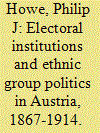

|
|
|
|
|
| Publication |
2010.
|
| Summary/Abstract |
This article tests ethnic exceptionalist and non-exceptionalist theories of political behavior by analyzing parliamentary elections in the Western half of the Austro-Hungarian Monarchy. Austria's gradual implementation of universal manhood suffrage before World War I provides an excellent opportunity to assess the effects of ethnic divisions in a democratizing country. Examining the interaction between political institutions and ethnic divisions affirms that voters' choices and the resulting party system were no more likely to reflect ethnic than other societal cleavages.
|
|
|
|
|
|
|
|
|
|
|
|
|
|
|
|
| 19 |
ID:
129989
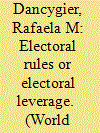

|
|
|
|
|
| Publication |
2014.
|
| Summary/Abstract |
Immigration has fundamentally altered the ethnic and religious makeup of most advanced democracies, but substantial variation is observed in the political representation of immigrant-origin minority groups across countries and cities. Though existing research has highlighted the role of electoral institutions in explaining minority representation, it is often difficult to isolate their effects across contexts. Focusing on Muslims in England and employing a new data set containing over 42,000 candidate-level observations, this article explains Muslim candidate election and selection. To do this, the author makes use of a rule change whereby a subset of localities switched from the use of multimember elections to the use of single-member elections. She finds that these electoral rules have no significant effect on the share of Muslims that gets elected but that they do influence the selection process: in a given election, Muslims are half as likely to be selected when only one seat is up for election as compared with when three seats are in play. Yet parties balance the slate across consecutive single-member elections, leading to similar results across systems. Further, the more undesirable the seat, the more likely it is to have a Muslim on the ticket, but this effect holds only in single-member elections, and it reverses as Muslims gain electoral leverage. Overall electoral leverage proves crucial: the effect of institutions and the potential for institution-based discrimination are conditional on the size and concentration of the local Muslim population and the votes it can deliver at both the election and the selection stages.
|
|
|
|
|
|
|
|
|
|
|
|
|
|
|
|
| 20 |
ID:
166624
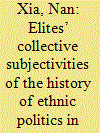

|
|
|
|
|
| Summary/Abstract |
Malaysia is one of the multi-ethnic, multi-cultural and multi-religious countries in Southeast Asia. Due to the pluralistic nature of Malaysia, it has a political structure based on ethnic politics. The ethnic preferential policies affected most domains of this country. The objective of this article is to examine the origin and background of ethnic politics in Malaysia. Findings of this study indicate that, ethnic politics originated during the British colonial period, it became a tool used by the Barisan Nasional for the legitimacy of regime. Moreover, ethnic politics in Malaysia today is intertwined with religion. Besides, there is the dilemma of the choice between the interest of certain ethnic group and national interests. However, with the opposition coalition Pakatan Harapan won the election in 9th May, UMNO-led BN lost power and interrupted its 61 years control, which leaves us an interesting topic to think about the future of Malaysian ethnic politics.
|
|
|
|
|
|
|
|
|
|
|
|
|
|
|
|
|
|
|
|
|